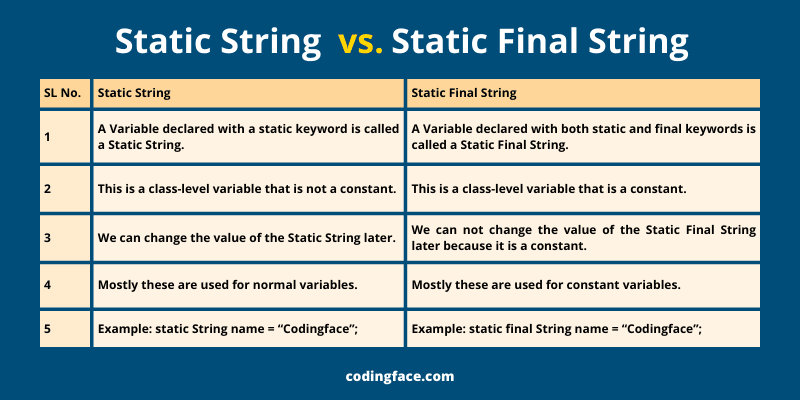In this tutorial, We will try to find the difference between Static String and Static Final String in Java. See the complete tutorial to understand the exact difference.
What is Static in Java?
Static is one of the popular keywords in Java which refers to a class rather than an instance of a class. Static members can be accessible with the help of their class name. The Static keyword can be used with variables, methods, blocks, and nested classes also.
What is Static String in Java?
Any String variable declared with a static keyword is called a Static String in Java. These variables can be accessed directly inside the same class and can be accessible with the help of the class name outside of class. We don’t need to create an instance of the class to access static variables.
- Static variables are memory efficient. They are initialized once and can be used multiple times.
- Static variables belong to a class.
- A single copy of a static variable can be shared with multiple instances of a class.
- Static variables are created when the execution of the program starts.
Examples:
static String name = "Codingface";
static String place= "Delhi";Code language: JavaScript (javascript)What is Static Final String?
Any String variable declared with both static and final keywords is called a Static Final String. The value of a Final Static Final String variable can not be changed later and this variable refers to a constant in Java.
Examples:
static final String name = "Codingface";
static final String place= "Delhi";Code language: JavaScript (javascript)When We Should Use Static String?
- When we want to use a single variable in multiple instances of a Class.
- When we need to access any String variable directly inside the class and with the help of a class name outside of the class.
When We Should Use Static Final String?
- When we need to access any String variable without the help of an instance of a class and the value of the variable will not be changed in the future, we can declare that variable as the static final String variable.
Difference Between Static String and Static Final String
| SL No. | Static String | Static Final String |
| 1 | A Variable declared with a static keyword is called a Static String. | A Variable declared with both static and final keywords is called a Static Final String. |
| 2 | This is a class-level variable that is not a constant. | This is a class-level variable that is a constant. |
| 3 | We can change the value of these variables later. | We can not change the value of the Static Final String later because it is a constant. |
| 4 | Mostly these are used for normal variables. | Mostly these are used for constant variables. |
| 5 | Example: static String name = “Codingface”; | Example: static final String name = “Codingface”; |
Related Queries
- What is Static String in Java?
- Static String java example.
- What is a static final String in Java?
Recommended Posts
- Find Double Letter Sequence Words In Java – Best 2 Programs
- How To Remove Particular Character From String In Java[2022]
- Java Program To Remove Duplicate Words In A String – 3 Ways
- Java Program To Print Vowels In A String – 2 Simple Programs
- How To Check String Contains Special Characters In Java?
FAQs
What is the difference between the general static variable and the final static variable?
The value of the general static variable can be changed but the value of the final static variable can not be changed as it is a constant.
Is Static and Final are same?
No, both are different keywords in Java. Static variables have only one copy of the variable available in memory for all instances of the class and the final variable value can not be changed. It is a constant.

1 thought on “Static String vs Static Final String in Java – 5 Differences”